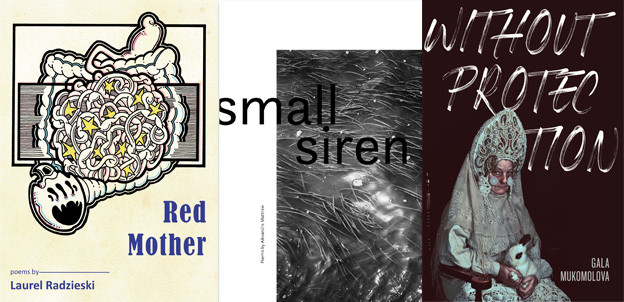
In hollows
Kenna O'Rourke

Kenna O’Rourke reviews three poetry titles featuring dysfunctional relationships: Red Mother by Laurel Radzieski, small siren by Alexandra Mattraw, and Without Protection by Gala Mukomolova.
Red Mother, Laurel Radzieski (NYQ Books, 2018)
Red Mother asks the reader to consider a meaty host’s innards as objects of desire: written from the perspective of a parasite, these short poems force us to “Imagine a blemish / or, better yet, a sore” with a kind of twisted love. Like a teeming catalog of left-justified grubs, Radzieski’s poems become progressively more objectifying, abusive, desperate for pure disembodied flesh. Where the speaker-worm begins from a place of supposed tenderness — “This is a love poem / I’ll prove it to you” — its impending demise, a growing hunger for possession, soon turns it egomaniacal: “I am securing / your humanity. … A ‘thank you’ / would be nice”; “If I was so unwanted / why did you lead me on / with your fluids?” To be human, the poems imply, is to writhe and squirm with that which eats away at you, those particular types of repulsive creatures so blind to their own being that they ask “Is this my anus / or my mouth / or something more useful?”
small siren, Alexandra Mattraw (The Cultural Society, 2018)
Alexandra Mattraw’s debut collection draws associative maps, images coalescing and evaporating in floating patterns. There is a quality like mist to her work; the poems branch and disperse, miss syntactic steps on purpose, wonder “how / can any symbol manage itself.” Colons, slashes, footnotes, neat squares and formless spaces: each has a purpose in these poems, but the reader isn’t necessarily in on the secret. We see glimpses of narrative — “He says I’m sorry I narrate everyone I meet”; “you apologize I / become an echo / a hollow / a hollow who / I really wish / was sorry” — but the poet only gives us so much. This only makes the verse more tantalizing — after all, as one title proclaims, “We must imagine Sisyphus happy.”
Without Protection, Gala Mukomolova (Coffee House Press, 2019)
Without Protection is filled with objects of queer immigrant ritual: Baba Yaga’s chicken-legged house, seawater, craigslist ads, a wallet named Peter, deli ham sliced so thin you could cry. Mukomolova mixes rewritten folklore with good and bad sex, dark ends and hopeful beginnings — for “what built the house also dug / the grave.” A heroine, Vasilyssa, finds Baba Yaga in the woods, “wears a witch’s cloak / to the witch’s clearing they are both crones”; likewise, the poems’ speaker knows “We, the daughters between countries, wear our mean mothers like scarves around our necks.” Navigating the wooded clearing or a “bad lesbian performance piece” (“I puncture your yoga ball. Or, the dog did.”), these poems sound through emptiness, loss, love: “On Yom Kippur, we lit a candle for the dead and no one knew a prayer.”